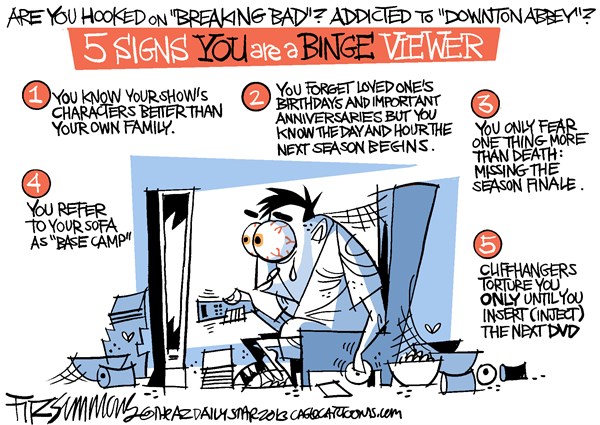Resonance
William Coleman
 It’s a measure of my addiction to House of Cards that I wound up watching an episode on my laptop, earbuds firmly in place, while, in the same room, my wife watched Into the Wild on the television.
It’s a measure of my addiction to House of Cards that I wound up watching an episode on my laptop, earbuds firmly in place, while, in the same room, my wife watched Into the Wild on the television.
As my show progressed, an episode that contained a subplot about a local BBQ joint that gained sudden notoriety, I found my gaze vacillating between my screen and the one behind it. It’s an all-too-familiar feeling—my attention tentative, or skittering along the surface tension of reality.
But then a moment happened when the gap between my knowing one screen and knowing another contracted, drawing both together. So it was that I saw two women, who’d known each other only from a fellowship hall, share an intimate first kiss in bed even as I saw men gather on the street outside, tearing at their barbeque ribs with their hands.
Of course it was coincidence. Characters in Sean Penn’s film happened to be eating what characters in House of Cards had been eating. But for an absorbing moment, I believed I was watching two scenes from the same show at once, each counterpointing the other. It was compelling.
But the convergence also gives me pause. More and more, I see my high school students as a mesh of interactivity. “Is it really possible to work a laptop, a cell phone, and an iPod simultaneously, while ‘doing homework?’” one mother recently asked rhetorically, on Facebook.
I’ve always assumed the answer to that question to be no, which is why in my literature classroom, I try to create conditions for entrance into what Sven Birkerts calls deep time (contemplative space where we can come to know the resonance of the data we’ve accrued), conditions I find increasingly at odds with the culture’s. We read aloud. We read slowly. We look up words. We read by candlelight.
And yet what we discover at those depths seems to be the very awareness of multiplicity and convergence that I found when the art on my wife’s screen became entangled with the melodrama on my own. We find the arguments and images that etymologies form. We find charges of thematic meaning around which opposing words scatter. We follow lines of allusive thought. In our deep time, we learn to see narratives that run like programs in the background.
Why does it bother me, then, to think that the idea of being offered merely one narrative at a time in a movie theatre or on a television screen might soon seem simplistic, or worse, inauthentic? What is the danger that our minds may be changing such that split-screen (or multi-screen) storytelling, in our multi-tasking culture, will become the only way to communicate in a way that feels true?
After all, couldn’t the evolution of consciousness—toward the meshing of seemingly competing attractions for attention—be reflective of a growing understanding of the deeper reality quantum physics gestures toward: a world of superposition and entanglement?
Maybe. But if so, when given the choice between attractions that arrive in our laps in high definition and the kind that are indistinguishable from darkness until our eyes are trained to see them, I am afraid that I and many of my students will increasingly choose what comes to us.
Reflecting natural forces is not the same as embodying truth, and it’s not the same as knowing either one. If we are to feel and know the resonance of all that converges, if we are interested in wisdom, we must, again and again, learn how to read. That, I see here beneath the words, is why I teach.
(Self-portrait by Rene Magritte)
